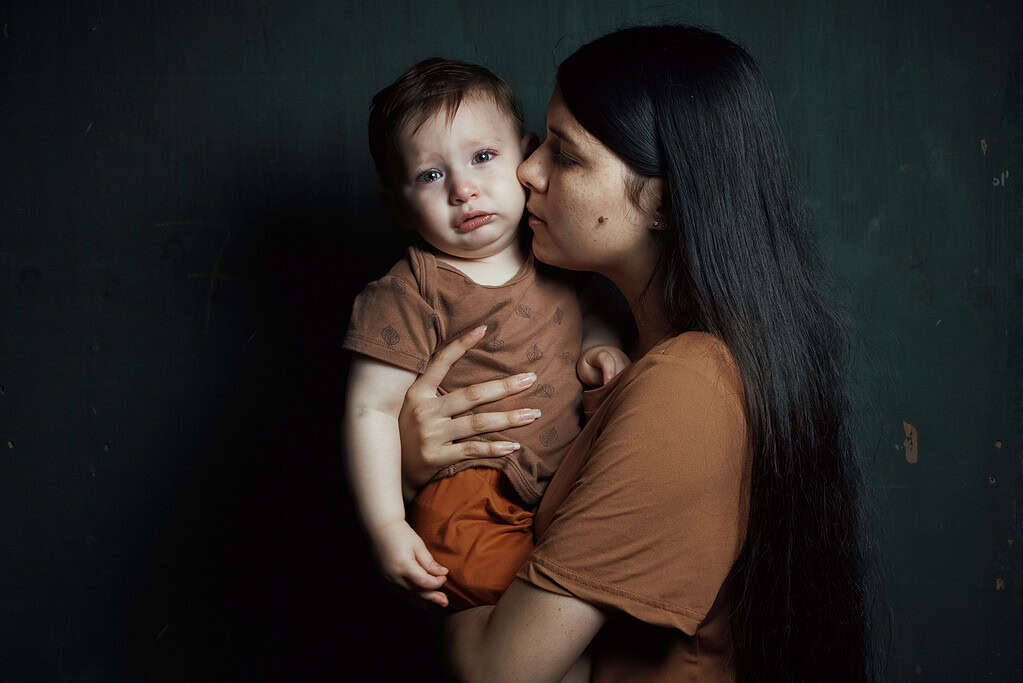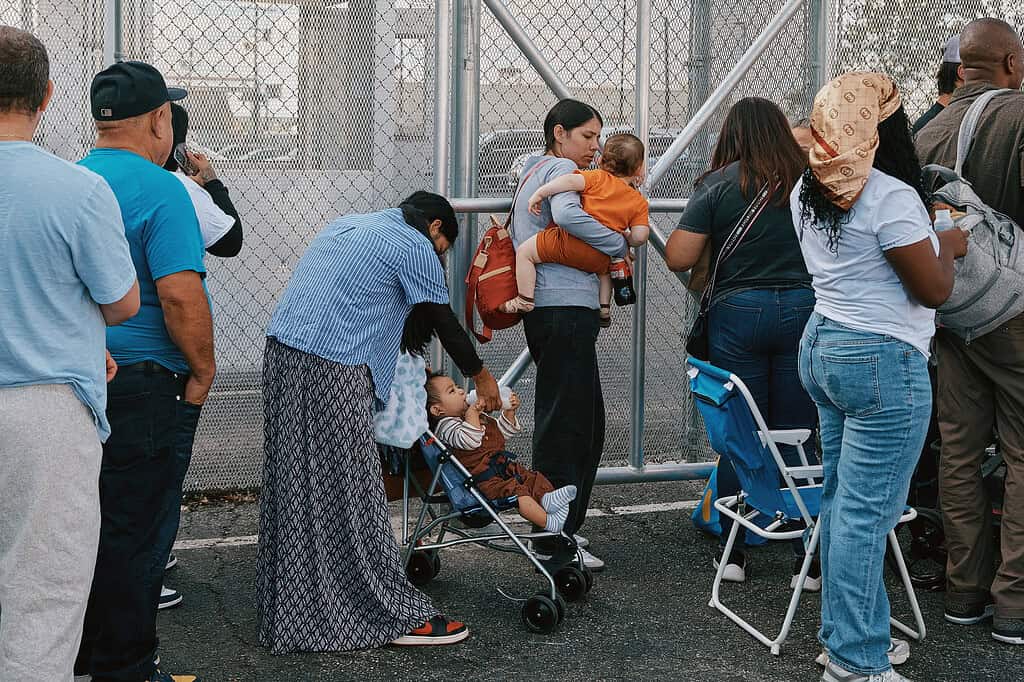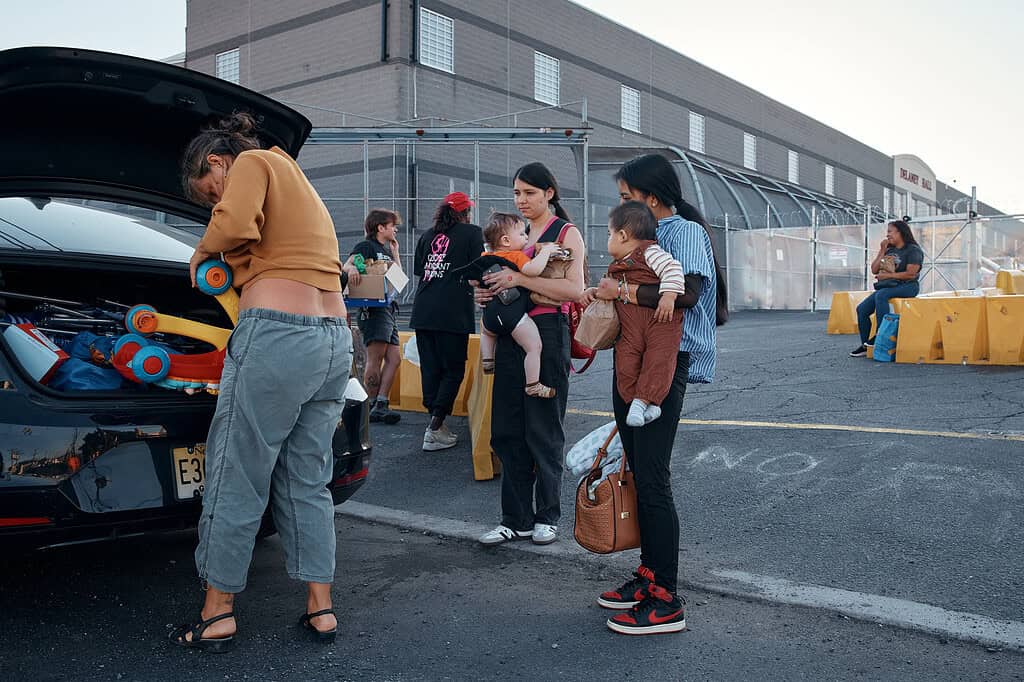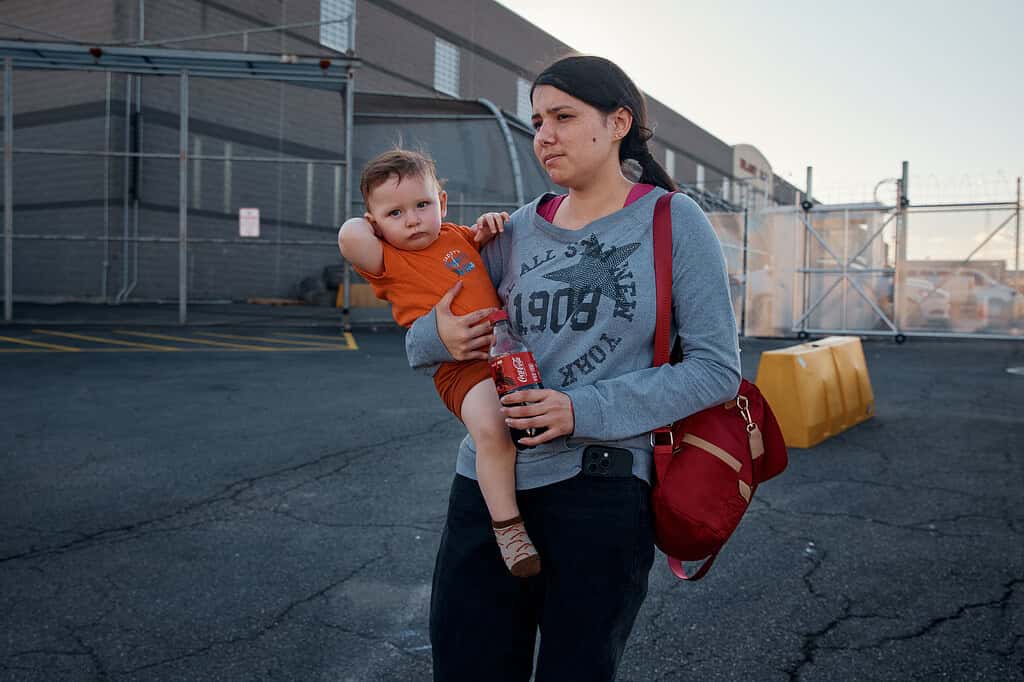Her husband was detained by ICE, now she and her baby are homeless and hungry

On the Sunday that Dylan Sequera turned one, his mother dressed him carefully in the outfit she had been saving for the special day. She had been planning the day for weeks, imagining the moment she would carry her son through the gates at Delaney Hall in Newark so her husband could see his child on his first birthday.
The court date for her husband’s asylum hearing was only days away. A future together, as precarious as it was, still seemed possible.
Instead, Dylan’s father was not there. He was in Louisiana, in a detention facility far from New York or New Jersey, far from the room where the family had lived together, or the parks where he used to lay a blanket on the grass for his son. The transfer had come suddenly, in the middle of the night, just a week before the court hearing.
When September 7 arrived, Dylan’s father cried alone, thousands of miles away, in a place where the air was thick and food was scarce.
For Yhornelis Torres, who had crossed jungles, rivers, and countries with her husband in search of a safe place to raise their child, it seemed cruel to arrive in America, hold her baby in a New York hospital across from Central Park, begin the fragile project of building a life again, and then find herself alone in a homeless shelter without her husband, watching Dylan grow pale and anemic due to a lack of food.
Before ICE detained her husband, the couple rented a single room in an apartment in downtown Manhattan. It was small, but it was theirs.
Her husband, Dwight Sequera, 32, worked at the deli downstairs. Some days he washed dishes. Other days, he unloaded deliveries. Sometimes he did odd jobs to make ends meet. He left around eight in the morning and returned by four.
Yhornelis Torres, twenty-five, stayed upstairs with the baby. In the afternoons when the weather was warm, they went to the park. Dwight Sequera carried a blanket and food from the deli—rice, beans, chicken, fish. Dylan played while they ate together. Dwight Sequera liked to lift his baby high up in the air, making him laugh.
Those evenings, under the summer sun, offered a brief sense of stability. It lasted until the morning federal agents appeared at the courthouse in Lower Manhattan.
Venezuela
In Venezuela, Dwight Sequera’s brother had been a soldier in the National Guard. He decided to become a deserter because he was unwilling to serve under superiors who threatened him. Almost immediately, the family began to feel the consequences of his departure.
Armed men arrived at their home. They wore green uniforms, carried weapons, and came in military vehicles. They wanted him back.
When they didn’t find him, they turned to his brother, Dwight Sequera. They warned him that he would pay the price if his brother did not surrender. On the second visit, they beat him. His nose remains crooked from the blows.
“They said if his brother didn’t appear, the consequences would be worse for him,” Torres said.
Within days, the family left for Colombia. They met up with Dwight Sequera’s brother and began the journey north.

The Darién Gap
The first stretch of the journey was by bus through Colombia to Necoclí, the coastal town where migrants board small boats that carry them to the edge of the Darién Gap. From there, there is only one path — walking.
They spent two and a half days in the jungle. They carried little and moved steadily as they walked through the mud and dense jungle, crossing rivers, until they reached Panama. Buses carried them onward to Costa Rica, Nicaragua, Honduras, and Guatemala.
But Mexico was different.
They stayed there for a month, waiting for a Customs and Border Protection (CBP) One appointment that never came. During these appointments, Customs and Border personnel inspected migrants and allowed them to access the U.S. asylum process. The couple worked small jobs and tried to save money while they waited. Then they decided to move forward. That was when the police stopped them.
During the day, at a roadside checkpoint, Torres, Dwight Sequera, and two other men were pulled from a taxi. Torres was searched by a male officer, an experience she described as humiliating. The police stole money from the other men. They threatened to deport them, saying they didn’t care if the mafia killed them, calling them “dogs.”
Torres and Dwight Sequera were pulled from a taxi. Fortunately, Torres had hidden $250 in her clothing. Hours later, they were released. They rented a cheap hotel near the border. The next morning, they reached the Río Bravo.
For eight hours, they waited on the riverbank. U.S. agents were visible across the water. The migrants begged to be let through. Eventually, they decided to cross.
On the U.S. side, they were lined up, photographed, and processed. Dwight Sequera was held for three days in a freezing cell that migrants call la hielera—the icebox—crammed in with dozens of people.
Torres was transferred to another Texas detention center. She spent a month there. Food was scarce. She lost almost 10 pounds. Some days, she was dizzy because she was so hungry.
Two weeks later, she was interviewed by officers. She described the threats, the beatings, and the armed men. The officers ruled in her favor. She was released in October.
By then, Dwight Sequers had been freed, and he went ahead to New York. The couple reunited in Manhattan. They began their lives again.

The courthouse
Almost two years later, on June 25, 2025, Dwight Sequera had his second preliminary immigration hearing on the 15th floor of 290 Broadway.
The judge asked if he had a lawyer. He said no, but promised to bring one to the next hearing. She scheduled a date for 2026. She asked if he still lived at the same Manhattan address. He said yes. She told him to sit and wait while his paperwork was processed.
Fifteen minutes passed. They waited. Dylan, nearly one, slept in his mother’s arms.
Then, three agents appeared in the hallway. Torres remembers one clearly. He was blonde with blue eyes, thin, and had a hood pulled up over his head. With no explanation, the agents told Dwight Sequera to hand over his passport and remove his backpack.
Torres cried, showing them the court paper.
“He has his next court date,” she said, pleading to them. They said nothing. She said when bystanders tried to intervene, the agents warned them in English: “Interfere, and you too could be detained.”
The baby woke to the noise and watched his father being taken away.
That evening, Dwight called his wife. He told her he was now across the street, on the tenth floor, crammed into a small room with dozens of men. Some had gone three days with little food. The bathroom was always full. People even sat inside it. They were given a little water, sometimes an apple.
Agents told him to sign voluntary deportation papers. He refused. He told them he had done nothing wrong. He had gone to his hearing. If he had to sign anything, his lawyer should be there. Eventually, they told him to talk to his lawyer, request a bond, and maybe he would be released.
The transfers
The couple found a lawyer. But the bond was denied. He had been in the country less than two years. That counted against him.
For a while, he was held at Delaney Hall in New Jersey. Torres managed to visit him three times.
Then, on September 5, without warning, guards woke him at 2 a.m.. By 9 a.m. he was on a plane to Louisiana. His clothes were gone. He wore only detention garb. After five days, he was flown to Denver.
His asylum hearing, which was scheduled for Sept. 12, has been postponed until Oct. 21.
On Sept. 7, Dylan’s first birthday, his father wept at the Denver detention facility.
“He was very sad, horribly sad,” Torres said.
The shelter
Alone, Torres could not pay the rent. Dwight Sequera had been their sole breadwinner. She applied to live in a homeless shelter.
The shelter provides housing, but not food. For Dylan, still an infant, that was not enough. He grew sick. His hemoglobin dropped to 10. Doctors diagnosed him with anemia.
Recently, Torres received her Social Security number. She wants to work, then apply for childcare support. But she cannot place Dylan in daycare without a job, and cannot work without someone to watch him.
“Alone it is more difficult,” she said.
Her greatest fear is deportation. If her husband is sent back to Venezuela, she believes he will be thrown in prison. She has heard about the Helicoide, the notorious Caracas detention center where political prisoners are held without contact.
“They mistreat them, they hit them, everything,” she said.
Families are not told where their loved ones are—or if they are alive.
Appeals
She still wants to fight to stay in the U.S. and believes asylum is their only path forward.
From the beginning, she says, they tried to do everything right. They turned themselves in at the border. They filed for asylum immediately. They wanted to live legally, to work, and to raise their child.
“Let him fight for his asylum, because he filed for asylum when we arrived,” she said. “If my husband is with me, he is a very big support. I know that I would get ahead much faster than alone.”

Our independent local news reporting needs your support
Investigative, accountability, and service journalism take time. Original local reporting is also expensive to produce. We’re a nonprofit newsroom made up of New Jersey residents, working every day to serve the state we love. Unlike outlets owned by corporations or hedge funds, we answer only to you.
Your tax-deductible gift in any amount makes it possible for us to delivering the kind of in-depth reporting New Jersey deserves.
Will you help us sustain independent journalism for the Garden State?
Krystal Knapp is the founder of The Jersey Vindicator and the hyperlocal news website Planet Princeton. Previously she was a reporter at The Trenton Times for a decade. Prior to becoming a journalist she worked for Centurion, a Princeton-based nonprofit that works to free the innocent from prison. A graduate of Smith College, she earned her master's of divinity degree from Princeton Theological Seminary and her master's certificate in entrepreneurial journalism from The Craig Newmark School of Journalism at CUNY.


